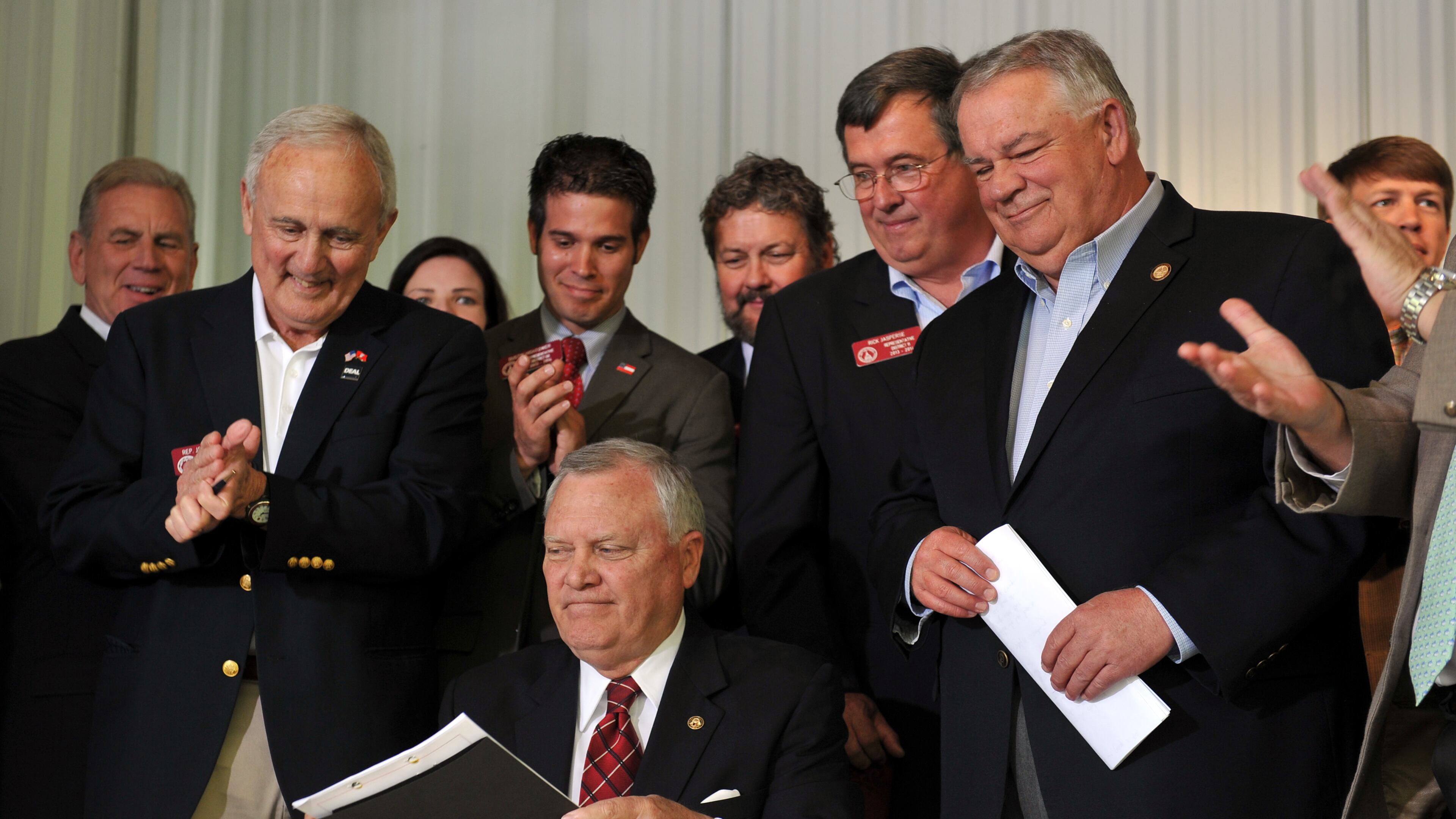A House speaker under siege by tea party forces

Ellijay, Ga. -- On Wednesday, Gov. Nathan Deal and his extensive entourage could have trekked to any one of 180 House districts to sign HB 60, the gun bill – now law – that will greatly expand where concealed weaponry can be carried.
But as a favor to one of his most important allies in the state Capitol, Deal chose the picturesque banks of the Coosawattee River here in House District 7.
That’s because Speaker David Ralston of Blue Ridge, the second Republican to hold that position and the first from north Georgia, is under siege.
Among the high crimes and misdemeanors allegedly committed by the north Georgia lawmaker: “It is my understanding that he has a MARTA card, and [thinks] that what’s good for Atlanta is good for Georgia,” said Sam Snider, his GOP primary challenger.
Scoff if you must, but the Ralston-Snider contest is one of a handful of House GOP primaries that pit “liberty” adherents against fellow Republicans who prefer a more pragmatic brand of conservatism. The outcomes on May 20 could well determine the tone of next year’s session of the General Assembly.
Tea party forces, showing some evidence of financial backing, have lined up behind Snider, a Gilmer County high school wrestling coach with 13 state championships under his belt. The strength of the insurgency is difficult to measure, but Ralston is taking no chances.
The speaker has a TV ad out, featuring a woman saved by a helicopter ambulance service that Ralston brought to the area. Ralston signs are on virtually every corner.
Top-of-the-ticket figures like Deal or Michelle Nunn, the Democratic candidate for U.S. Senate, may be skimping on debates with their challengers. Ralston can’t afford to. On Tuesday night, in Ellijay, the House speaker completed a trio of public confrontations with his rival.
“People should have the opportunity to hear both of us answer questions,” Ralston said afterwards in an interview at the Gilmer County courthouse.
The tea party bill of indictment against Ralston is extensive and somewhat contradictory.
While acknowledging the necessary link between roads and jobs, Snider is critical of the House speaker’s role in putting a transportation sales tax before voters – a series of regional referendums that failed in north Georgia and metro Atlanta, but succeeded elsewhere. (It was during this 2010 legislative debate that Ralston brandished a MARTA fare card as a prop.)
Snider disagrees with the use of public monies for the deepening of the Port of Savannah, which Ralston considers critical to economic development in the state.
On Tuesday night, the challenger pointed out that the state budget has grown from $18.3 billion to over $20 billion in the last four years. Ralston replied that much of the growth is the reversal of cuts to education made during the Great Recession. New spending includes raises for teachers, even wrestling coaches.
A favorite target of Snider has been the recent, legislative-approved funding for a $17 million parking garage requested by the Georgia World Congress Center, which will be used – at least in part — by attendees of a new Atlanta Falcons stadium. Ralston argued that other state-owned facilities need parking, too, including a new College Football Hall of Fame.
And then there are the social issues. Two years ago, the House spearheaded one of the toughest anti-abortion bills in the nation – prohibiting the procedure after the 20th week of pregnancy. Snider and supporters say it isn’t strict enough.
“Eighty-five percent of abortions are performed before 20 weeks. How does that protect the unborn?” argued Margaret Williamson, who said she was among those who invited tea party forces into the district to help Snider.
Debbie Dooley of Atlanta Tea Party Patriots has rented a cabin in the district through the May 20 primary to work against the speaker. Ray Boyd, a real estate millionaire believed to be funding much of the anti-Ralston effort, took out an ad in the local newspaper to declare Snider a “knight in shining armor.”
Ralston’s dilemma would be familiar to John Boehner of Ohio – call it the curse of all speakers, everywhere. A House speaker serves a broad political body, whether state or nation, but answers to a small, specific community.
The benefits to that community can be substantial. In his three debates, Ralston has talked of local citizens he’s appointed to powerful state authorities. A budget bill to be signed by the governor next week will show that a satellite campus of the University of North Georgia, which was headed elsewhere, will now be located in Ralston’s district – in Blue Ridge.
“I’m not a knight in shining armor. I am the other guy. And I’m kind of proud of being the other guy. I’m not perfect. I just get up every day and work hard,” Ralston said on Tuesday.
Overall, Snider argues that the speaker’s statewide responsibilities have caused him to lose touch. In three debates, the coach made clear that the interests of Gilmer, Fannin and Dawson counties – the three counties that comprise the 7th District – would be his sole concern.
“If the beliefs that we have are good for us, they’re good for down there,” Snider said Tuesday night.
Snider’s is a brand of isolationism that isn’t mountain-born, Ralston said later. “The mountain thinking I see now is people like the farmers here in Gilmer County,” the speaker said. “They’re not isolationists. Agri-tourism is a big deal here. They’re wanting people to come here.”
Ralston included Snider among those “who feel that government – in ways that we have never thought before – is the enemy. I don’t associate that with traditional mountain thinking at all. This is a new kind of thing.”
“It’s either a phase that we’re still going through, or a phase that’s about to end. And I think we’re about to find out, on the night of May 20, where we are,” the speaker said.

